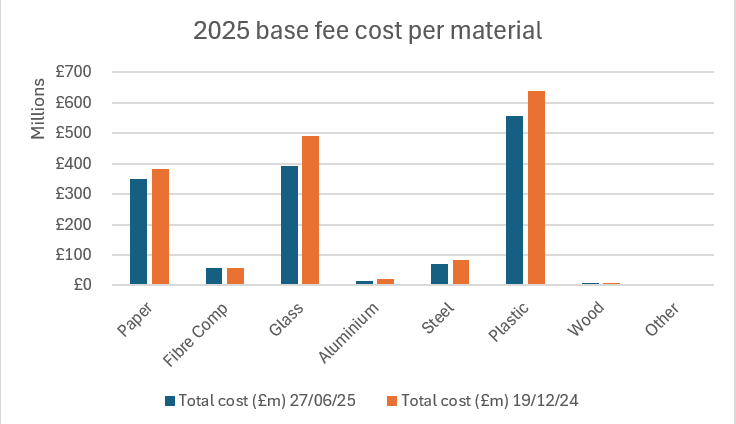Refresh this page for the latest responses.
More on this story: Circular Economy – Timmermans talks of ‘ambition and realism’
_____________________________________________________________________________________________
3 December
Responses to the measures set out in the European Commission’s Circular Economy package are continuing to flood in. Follow our blog throughout the day for the latest reaction.
_____________________________________________________________________________________________
Bird: not enough on producer responsibility
16:42 Local Authority Recycling Advisory Committee (LARAC) has welcomed the new Circular Economy and its recycling targets for member states. However, it has questioned the continued focus on municipal waste when it makes up only a “small proportion” of overall waste and is also concerned the package does not contain enough levels on producer responsibility.
Andrew Bird, chair of LARAC, said: “For local authorities to be able to really play their part they need the products to be designed differently and reprocessors to work differently. Councils are stuck in the middle of the chain and too much focus is placed on them when more meaningful change will come from other parts of the supply process”.
LARAC also states that without real investment in local authority collections the targets will be difficult to meet at a UK level, given the previous and ongoing cuts in government funding.
_____________________________________________________________________________________________
‘Positive step’ – Shanks
14.25 Shanks Group chief executive Peter Dilnot has welcomed the launch of the Commission’s Circular Economy package, adding that he welcomes the approach aimed at driving recycling and reuse.

“We will actively engage in the process of refining the package from here and look forward to supporting its implementation in due course.”
________________________________________________________________________________
DS Smith’s Clayson points to ‘missed opportunities’
11.30 Responding to the announcement, Peter Clayson, business development and external affairs manager, said: “While we welcome the publication of the Circular Economy Package we feel there are some missed opportunities where the European Commission could have developed a stronger programme.
“The package reflects the need to look at the whole lifecycle of a product from the design stage through to the end of its life. We welcome the proposal to differentiate financial contributions paid by producers under an Extended Producer Responsibility
scheme that rewards those who design products that can be more easily recycled or reused.
“Material efficiency and design for reuse, repair and recycling should be embedded in all products from the design stage. Part of this process should include incentives to encourage recovery and recycling at the end of a product’s life.”
_____________________________________________________________________________________________
PlasticsEurope welcomes landfill goals
10:30 European plastics industry association Plastics welcomes limits for landfilling of waste to 10% by 2030.
In a statement, the organisation’s executive director, Karl-H. Foerster, said: “The European plastics industry has been calling for a legally binding landfill restriction on all recyclable as well as other recoverable post-consumer waste by 2025. Although a 10% target constitutes a step in the right direction, it remains a timid attempt to put an end to the landfilling of all waste which can be used a resource.”
_____________________________________________________________________________________________
Viridor’s McAulay praises ‘balance’
09:40 A fresh resources sector perspective comes from Ian McAulay, chief executive of Viridor, who has offered a positive first analysis of the proposals.

“Whilst the package is ambitious and evidence based, only fresh thinking and bold action to replicate British and European best practice, will address the significant barriers to be overcome in order to realise the economic opportunity of a more circular economy.”
_____________________________________________________________________________________________
Labour: disappointment at lack of food waste measures
09:20 Kerry McCarthy, Labour’s Shadow Defra Secretary and a noted anti-food waste campaigner, offered her view on the measures outlined by the Commission yesterday and lamented the lack of compulsory measures on food waste. She said: “I welcome the publication of this long overdue, important package, but it’s disappointing that it is less ambitious, with lower targets, than the 2014 package – which was, after all, shelved so that a more ambitious package could be delivered.
“With the exception of some minor, but important improvements, it hasn’t delivered on this promise.
“It’s particularly disappointing that the proposals on food waste do not include a target for cutting food waste by 30% by 2025 – which would be aligned to the Sustainable Development Goal only recently agreed by the UN. There is no indication as to how this vital UN goal will now be achieved at European level.”
_____________________________________________________________________________________________
2 December
CIWM: ‘demand side hived off to Action Plan’

Mr Lee also commented on food waste provisions in the package. He said “Some will say there is a softer approach to food waste than was expected but this does not detract from the widespread consensus that food waste is the next ‘big bite’ when it comes to recycling and waste prevention. In the UK, we already have three countries with clear ambitions and policies on food waste, demonstrating that unilateral action in this area is possible. If England wants to follow suit, it doesn’t need to wait to be told to do so by Europe.”
_____________________________________________________________________________________________
Biffa – “package appears to be less ambitious”
16:42 Simon Rutledge, group external affairs and sustainability manager at Biffa, stated that the company is viewing today’s revised package with cautious optimism as it appears to be less ambitious than last year.
“With a target of 65% set for recycling municipal waste by 2030, this is a significant drop on the previous 70% stated in 2014, as is also the case for the unwillingness to stipulate a set percentage of recycled material to be used in products – a key element of a more Circular Economy,” he said.
However in general, the effort from policy makers to focus on more re-use and recycling as well as proposing economic incentives for producers to put greener products on the market is welcomed by Mr Rutledge.
“We are also pleased to see that the proposal specifies that member states shall ‘ensure’ the separate collection of bio-waste including food waste as opposed to previously merely encouraging this action,” he added.
_____________________________________________________________________________________________
ESWET hoped for more ambition
16:25 The European Suppliers of Waste-to-Energy Technology (ESWET) agrees with the commission for not presenting any measures to limit quantities of waste that may undergo energy recoveries activites.
At the same time, ESWET commented, “we hoped for more ambition to minimise landfilling of untreated municipal waste, but the proposal is a step in the right direction”.
Additionally, the company is pleased that the new proposal enables member states to count metals recycled from waste-to-energy residues, thus helping increasing recycling rates while helping to minimise landfilling.
_____________________________________________________________________________________________
CEWEP – ‘still work to be done’
16:13 The Confederation of European Waste-to-Energy Plants (CEWEP) welcomes the European commission’s ambition to minimise landfilling, increase the quality of secondary raw materials and introduce harmonised calculation methods for recycling.
However, it recognises that a lot of work still needs to be done. In particular, it stated that while the landfill cap introduced in the package is a step in the right direction, CEWEP would have liked to have seen a more ambitious approach.
_____________________________________________________________________________________________
Len: ‘it’s missed the mark’
16:04 Commenting on today’s proposals, Michal Len, director of the Reuse and Recycling EU Social Enterprises network (RREUSE) said that the Circular Economy package was an opportunity to turn the tide, “but it’s missed the mark”.
“While we welcome some of the encouraging language on opening up access for re-use organisations to waste collection facilities and the aspirations to boost repair by improving availability of spare parts and service manuals, there is precious little in the way of binding measures.
“Critically, there is no legally binding separate target for preparation for re-use, only encouragement for member states that want to do this. It’s vitally important that preparation for re-use becomes a clear part of the legal framework, not left as an afterthought for voluntary action,” he added.
_____________________________________________________________________________________________
esocurety calls for realistic targets
15:54 ecosurety, producer responsibility scheme provider in the UK, director David Burton, said: “While we welcome the fact the commission wants to capture an extra 600 million tonnes of waste currently going into landfill, we need to ensure that any legislative change is realistic, pragmatic and cost-effective and that pursuing recycling targets per se doesn’t end up with a net environmental deficit, because we will have taken our eye off the key issues of sustainability and climate change”.
_____________________________________________________________________________________________
REA: aspects ‘need to be looked into’
15:44 Renewable Energy Association (REA) technical Director, Jeremy Jacobs, commented: “Taken together, the actions planned should drive up the amount of biowaste separately collected in the UK each year.
“However, we are aware that budget-constrained local authorities will be carefully considering the TEEP caveat, particularly in England where separate biowaste collection is not currently a requirement in law.
“Economic constraints might also be overcome by EU structural funds for waste management and investments at national level, although these aspects of the Circular Economy drive need to be looked into”.
_____________________________________________________________________________________________
Perry – ‘lacking ambition’
15:38 The Environmental Investigation Agency (EIA) has said the package is “watered down and lacking ambition” but still a good place to start.
Clare Perry, EIA oceans campaign team leader, said: “A marine litter target of 30% is hardly aspirational given that, according to the commission, the watered down legislative proposals should deliver the 25% reduction without other measures that have been promised or are already underway.
“Despite this, the package forms a framework for more coordinated and effective European Union action on marine litter and we look to the European parliament to strengthen these measures in order to deliver the promised ambition.”
_____________________________________________________________________________________________
Liberal Democrats note ‘watered down targets’
15:24 The Liberal Democrats stated that while the new Circular Economy package was promised to be “more ambitious”, the proposals today have lowered targets in areas and have scrapped binding targets to cut food waste.
Liberal Democrat Catherine Bearder MEP commented: “Europe must not waste this opportunity to protect the planet’s resources and end the throwaway society. We were promised a more ambitious package, but the only ambition shown here has been for watering down targets. Ambitious targets, including for food waste, must be reinstated.”
_____________________________________________________________________________________________
Georgeson: long-term framework not clear enough
15:05 UK recycling and reprocessing trade association, Resource Association, has said that while the proposal is heading in the right direction, there is not a clear enough long-term regulatory framework that will drive investment and increase employment.

“The argument likely to unfold about the merits or otherwise of a 70% or 65% recycling target misses the point again that Europe would have been better served by a serious reboot of policy, incorporating carbon metrics not weight-based percentage targets and a holistic approach to the Circular Economy that incorporated real demand-pull measures, stricter approaches to eco-design and recyclability and much greater emphasis on prevention, reuse, repair and remanufacturing,” added Mr Georgeson.
_____________________________________________________________________________________________
ACE – still work to be done
14:58 ACE, the platform of the European beverage carton industry, supports the commission’s initiative to establish a coherent policy that meets the objectives of enhancing resource efficiency and increasing recycling and innovation.
However, ACE director general Bertil Heerink said: “Just increasing the individual recycling targets for key materials like paper, plastics and aluminum will not be sufficient to match innovation. Measures must be taken that strengthen existing recycling solutions, foster innovation in new recyclable materials and recycling techniques, resulting in a further increase in recycling of beverage cartons across Europe”.
_____________________________________________________________________________________________
Kirkman: ‘industry needs to take the lead’
14:17 Richard Kirkman, technical director Veolia UK and Ireland said: “These new targets from the EU are a big step to delivering a Circular Economy. However any percentage target must be supported by the material having a value and this means manufacturers need to start creating products that are truly recyclable and made from recycled materials.
“With recycling rates in the UK plateauing we need to find ways of making it easier to separate these materials and industry needs to take the lead on this. There are still a lot of consumer products that cannot be recycled. This could be a great British success story – we just need to make it as easy as possible for residents to recycle in the first place.”
_____________________________________________________________________________________________
Gerstrom – ‘overall direction seems right’
14:10 The Environmental Services Association (ESA) chairman, Peter Gerstrom, outlined that while there is much to debate, the overall direction of travel including better product design, more recycling and reuse and less landfill, seems right.
“However,” said Mr Gerstrom, “the proposals must also address the demand side and that should be a key focus for the discussions that will now follow – markets for secondary raw materials are currently weak, with little or no sign of recovery. Without sustainable markets for these materials it will be very difficult to deliver the commission’s vision of higher recycling rates and a more Circular Economy”.
_____________________________________________________________________________________________
EUROPEN pleased with holistic approach
13:53 The European Organisation for Packaging and the Environment (EUROPEN) has said it is pleased that the proposal recognises the enabling contribution packaging makes in a Circular Economy.
In addition to supporting the retention of the internal market safeguard, Virginia Janssens, managing director of EUROPEN, added: “We welcome the proposal’s intention to improve the transparency of and rule enforcement for existing EPR schemes, as well as the accountability of different actors in EPR implementation.
“In line with this shared responsibility, we will now assess the implications of some of the proposed wording in particular related to producers’ financial contributions to these EPR schemes.”
_____________________________________________________________________________________________
FEAD: slight changes needed
13:38 The European Federation of Waste Management (FEAD) has welcomed several aspects to the commission’s proposal. However, while the commission appears to recognise the importance of creating resilient markets for secondary raw materials, FEAD members are disappointed that the proposals imply that market mechanisms alone will achieve this.
FEAD president David Palmer-Jones said: “Europe’s economy can only be truly circular if strong markets are available for the secondary raw materials the recycling and reprocessing sectors produce. The current markets are unstable and disincentivise secondary raw material production and uptake by Europe’s industry”.
_____________________________________________________________________________________________
Arditi: lower recycling targets creates ‘missed opportunity’
13:22 Stéphane Arditi, policy manager for products and waste at the European Environmental Bureau, said that the addition of some nice initiatives does not offset the fact that the legally binding core of the package, notably the waste targets, is weaker than last year’s.
Ms Arditi noted that lowering the recycling targets compared to the 2014 proposal means that more waste will be sent to landfill, which is a “missed opportunity”.
“Europe has no choice but to become more efficient with the resources it uses but for it to happen fast enough European Parliament and the Council of Ministers will need to inject more life into this proposal, so that the EU can lead globally in this crucial area,” she added.
_____________________________________________________________________________________________
FEVE ready to ‘take on the challenge’
13:00 The European Container Glass industry has said that while the new recycling targets for glass packaging outlined by the EU commission are ambitious, the industry is ready to take on the challenge with the right support.
Vitaliano Torno, president of FEVE, the European Container Glass Federation said: “The proposed recycling targets for glass packaging are challenging especially for those countries where a lot still needs to be done; more investment will be needed to develop glass recycling infrastructures”.
A strong partnership between the manufacturing industry and other important partners of the value chain such as national and local authorities, waste processors, EPR schemes and consumers, will be essential to ensure a successful transition.
_____________________________________________________________________________________________
Zero Waste Europe: minor improvements
12:33 Resources NGO, Zero Waste Europe, has stated that the commission’s proposed legislation will not be sufficient to create a fully Circular Economy and said that the new package opens with the same scope as the former one.
Joan Marc Simon, executive director of Zero Waste Europe, commented: “Some minor improvements have been included, such as the introduction of a system to monitor residual waste, and the promotion of reuse of WEEE, textiles and furniture.
“Other positive elements are the expected improvement of methodologies and higher clarity in definitions and minimum requirements for EPR schemes that could pave the way to better eco-design”.
However, Zero Waste Europe said it is critical of the legislative proposal as it fails to address prevention and reuse, is less ambitious on separate biowaste collection and lowers waste recycling targets.
_____________________________________________________________________________________________
FoE laments ‘lack of ambition’
12:02 Environmental organisation Friends of the Earth, has said today’s proposal is not living up to its “more ambitious” promise and fears that it has become a casualty of the European commission’s so-called “Better Regulation” agenda.
Magda Stoczkiewicz, director of Friends of the Earth Europe, said: “This has been a year of unnecessary delay. Under the guise of Better Regulation, the commission has totally undermined claims of ‘ambition’ by watering down binding measures and giving member states a free pass to shy away from tackling our over-consumption crisis”.
Concerns outlined by the organisation include reducing the recycling target for 2030 to 65% from last year’s proposal of 70%, scrapping the commitment to reduce food waste by 30% between 2017 and 2025 and dropping any measures on resource efficiency.
Further comments said that “long term vision is missing from this package”.
_____________________________________________________________________________________________
Palmer-Jones: ‘heartening, but more work needed’
11:51 Waste management company Suez has welcomed the circular economy package but warned that further work needs to be done to stimulate European markets for recycled materials.
Chief executive officer of Suez, David Palmer-Jones, has said that many within the sector had hoped that the circular economy package would include policies to stimulate recycling markets by creating domestic demand for recycled materials, following significant fluctuation in prices for recycled materials.
Mr Palmer-Jones does describe the inclusion of the eco-design working plan for 2015-2017 as “heartening”.
However, “I do feel that the commission has not recognised that market forces and supply side measures alone will not deliver a circular economy,” and that, “the package could have, and should have, contained stronger regulatory ‘pull’ measures to create demand for secondary raw materials. Without this, we could quickly find that the collecting and sorting of these materials becomes uneconomic,” he said.
_____________________________________________________________________________________________
CEPI – ‘expectations met’
11:45 The Confederation of European Paper Industries (CEPI) director general, Marco Mensink said his expectations have been met.
“It is great to see that the commission recognises the need for separate collection of paper, providing good quality raw materials. We also appreciate that further limits to landfilling are being put in place. This is a file where the needs of industry closely align with many other stakeholder positions. The commission proposes a logical step forward,” he added.
CEPI also believes that the Commission is right in recognising recyclability as waste prevention and in harmonising the method for the calculation of recycling rates to make data more comparable and reliable.
_____________________________________________________________________________________________
Bioeconomy
11:36 Stephan Tanda, industrial biotech council chair, EuropaBio, said that the organisation has high hopes for the commission’s strategy but also some ongoing concerns.
“Sustainable jobs and growth and resource efficient, renewable products and processes are exactly what the EU needs right now. However this cannot be achieved without the right long-term framework conditions in place to attract the business investment needed,” he added.
Furthermore, EuropaBio members encourage the commission to take its 2012 bioeconomy strategy into consideration in the development of the circular economy action plan and to consider reviewing and revising this.













Subscribe for free